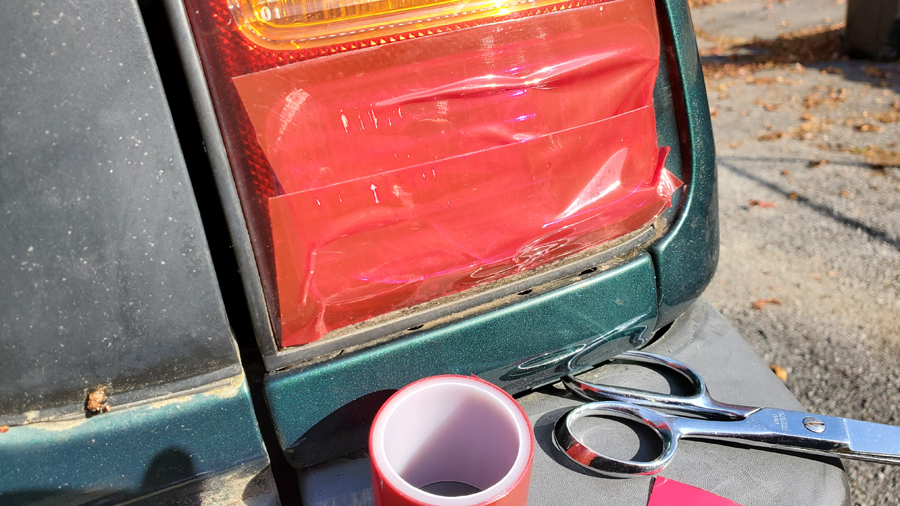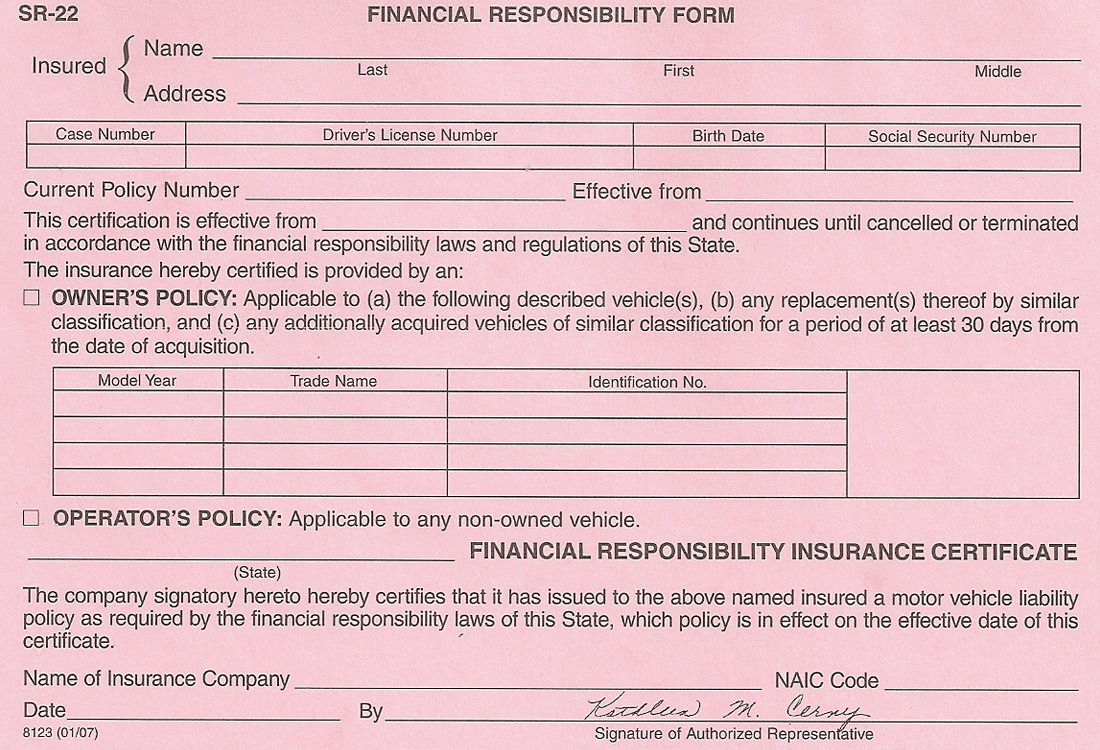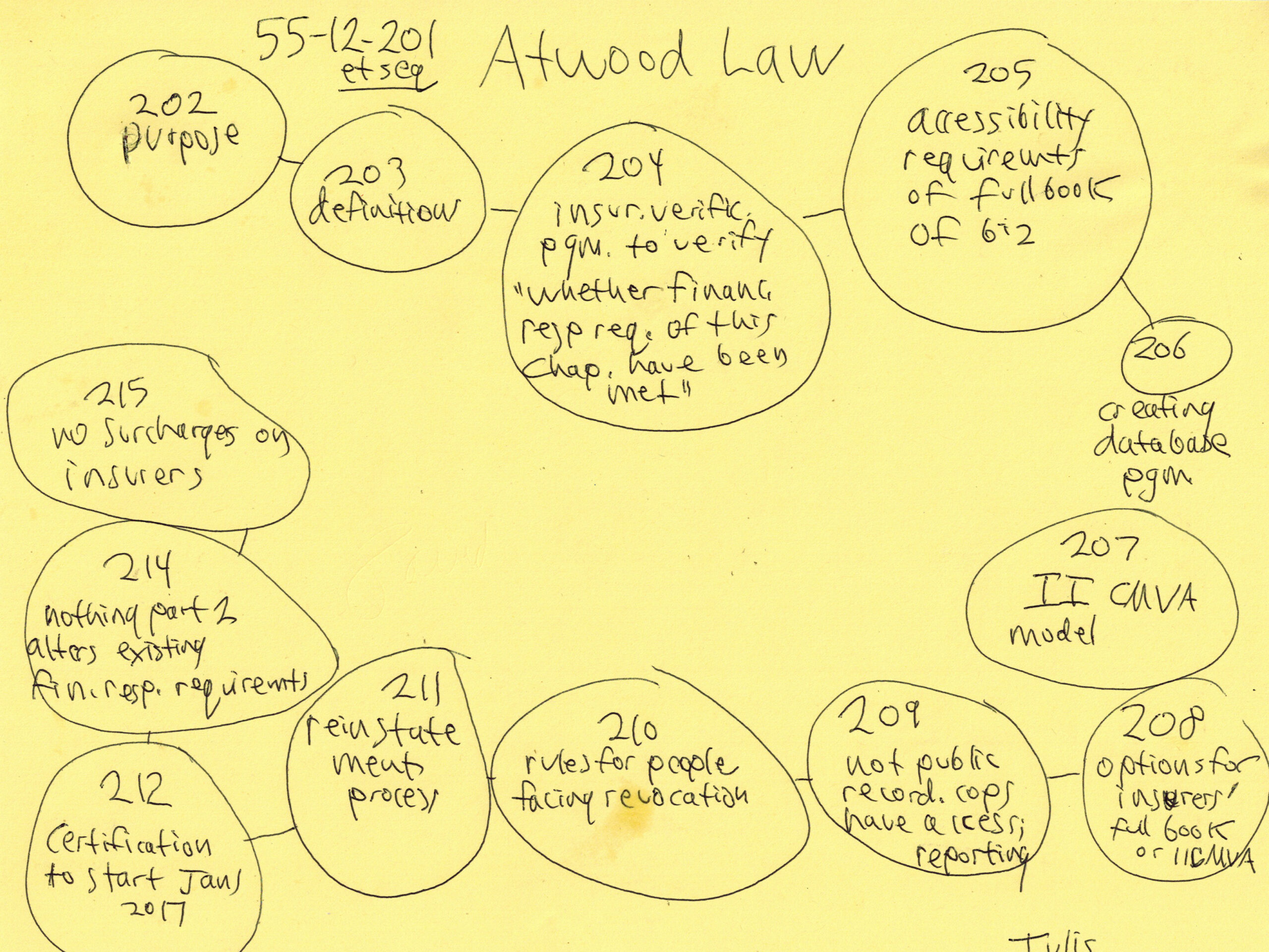
Red tape covers a damaged taillight on my RAV4, which damage caused the Hamilton County sheriff’s department to arrest and criminally charge me under Title 55, the motor and other vehicle law in TN used to run the state’s biggest Jim Crow oppression engineering program against blacks, the poor and everybody else thrown in for good measure. (Photo David Tulis)
CHATTANOOGA, Tenn., Tuesday, Dec. 5, 2023 — The scheme run by department of revenue in Tennessee is going to be argued almost entirely as a matter of law, with shocking revelations appearing on my reading of the statute.
By David Tulis / NoogaRadio Network
My defense to restore my motor vehicle registration leads to the conclusion that the department is running a fraud by pretending that all users of cars — all drivers, operators and owners of registered motor vehicles — must have insurance or post a F$65,000 bond to use the public roads.
This is extortion, with the victim (you) apparently getting an option on the F$65,000. If you don’t want to buy a F$65,000 bond, you can send the commissioner of safety, Jeff Long, a check for F$65,000 payable to the department. How is that for free choice?
I am suing to get my tag restored — but more significantly to junk the program top to bottom, from left to right.
What are the prospects of success?
To get a temporary injunction, I must argue four points. One is prospective irreparable harm. Another is harm or injury to the department. Another, public interest. The key argument is likelihood of success. Can the judge — Brad Buchanan, hearing officer — make an early determination on initial arguments and claims, prior to getting the case in chief, prior to the hearing in the David Jonathan Tulis v. DOR.

If you are subject to TFRL in Tennessee, you are likely to have SR-22 high risk insurance. Tennessee is an after-accident financial responsibility state and not a compulsory insurance state. But officials ignore clear law in support of the insurance industry.
Cases are clear that I am right, Gerregano wrong
The probability of success of this petition is strong because petitioner is defending the law itself as written, with support of numerous court cases that deny Tennessee runs an extortion racket upon the public and instead runs a properly legal and lawful financial responsibility regime for licensed drivers and operators using the people’s roads for commercial purposes as registrants with the department for their taxable and regulable activities for profit and gain under privilege.
From 1949 to the present, court cases describe TFRL as after-accident financial responsibility.
Mandatory Suspension for Violation of Financial Responsibility Law Tennessee’s “Financial Responsibility Law requires motorists who have been involved in an accident where anyone is killed or injured, or an accident resulting in more than $400 in damage to the property of any one person, to show proof of financial responsibility” — most commonly through proof of insurance. Purkey v. Am. Home Assur. Co., 173 S.W.3d 703, 706 (Tenn. 2005) (citing Tenn. Code Ann. § § 55-12-105,-139). A driver is also required to show proof of financial responsibility “[a]t the time the driver of a motor vehicle is charged with any violation under [the state’s motor vehicle safety laws or] any other local ordinance regulating traffic.” Tenn. Code Ann. § 55-12-139(b)(1)(A). Violation of the financial responsibility law is a Class C misdemeanor. Am. Home Assur. Co., 173 S.W.3d at 706 (citing § 55-12-139(c) ). By statute, the TDSHS “shall suspend the driver license of the TDSHS “shall suspend the driver license of the person convicted of” a violation of the law “[u]pon receipt by the commissioner of a record of conviction of failing to show evidence of financial responsibility.” Tenn. Code Ann. § 55-12-115(a). A driver seeking reinstatement of a license that was suspended for violation of the Financial Responsibility Law must submit evidence of financial responsibility, in addition to paying required fees. Tenn. Code Ann. § 55-12-115(b).
Robinson v. Purkey, 326 F.R.D. 105 (M.D. Tenn. 2018), p. 9 (emphasis added; section title emphasis original)
Numerous state cases agree with the federal court. Petitioner cites two rulings in Administrative notice on Tennessee law requiring proof of financial responsibility after roadway accident, submitted into the record and putting the commissioner on awares about TFRL’s duties imposed upon a limited segment of Tennessee’s motoring public.
An accident-free motorist “is at liberty to own and operate a motor vehicle without any insurance coverage or with as little insurance coverage as desired.” McManus v. State Farm Mut. Auto. Ins. Co., 225 Tenn. at 109, 463 S.W.2d at 703. Requiring proof of financial responsibility comes into play only after a motorist has been involved in an accident resulting in death, personal injury, or property damage in excess of four hundred dollars. See Tenn.Code Ann. § 55–12–104(a). These motorists must report the accident to the Commissioner of Safety.
Burress v. Sanders, 31 S.W.3d 259, 263 (Tenn. Ct. App. 2000)
“Tennessee is not a “compulsory insurance” state because our General Assembly has stopped short of requiring all vehicle owners to obtain insurance. See McManus v. State Farm Mut. Auto. Ins. Co., 225 Tenn. 106, 109, 463 S.W.2d 702, 703 (1971).. Like a majority of states, Tennessee has adopted financial responsibility statutes requiring motorists involved in serious accidents to prove their ability to pay up to a specified amount of damages or face the loss of their driving privileges. These statutes are intended to provide a more effective means of enforcing payment of automobile-caused damage claims, see Legislation, The Tennessee Motor Vehicle Financial Responsibility Act, 21 Tenn.L.Rev. 341, 342 (1950), and to take insolvent, financially irresponsible drivers off the roads of this state. See Erwin v. State Farm Mut. Auto. Ins. Co., 232 F.Supp. 530, 538 (E.D.Tenn.1964).
Id. Burress at 262–63 (emphasis added)
“A motorist may file notarized releases executed by all persons who filed a claim stemming from the accident. See Tenn.Code Ann. § 55–12–105(b)(4). Short of obtaining releases, a motorist may demonstrate financial responsibility three other ways. First, the motorist may file with the Commissioner written proof that he or she has insurance coverage. See Tenn.Code Ann. § 55–12–105(b)(1). Second, the motorist may execute and file a bond with the Commissioner. See Tenn.Code Ann. § 55–12–105(b)(3). Third, the motorist may file a cash deposit with the Commissioner. See Tenn.Code Ann. § 55–12–105(b)(2).”
Id. Burress at 264
The case Freddie J. Cook et al v. Mark Hughes, Case 3:05-cv-00439-HBG, filed Jan. 8, 2009, in U.S. district court in Knoxville, notes that, “Judge Koch, writing on behalf on the court, included an excellent discussion of the role of the Tennessee Financial Responsibility Act,” quoting for more than a page from Burress v. Sanders, 31 S.W.3d 259, 263 (Tenn. Ct. App. 2000).
An earlier case describes a longstanding legal structure regarding auto users’ financial responsibility duties in Tennessee protecting the public interest.
A number of states, perhaps all of them, now have statutes requiring owners and operators of motor vehicles to have certain financial responsibility or security. Some of the statutes require proof of financial responsibility as a condition of granting driver’s license, some have the same requirement as a condition for the registration of a motor vehicle. In some states the statutes require proof of financial responsibility after a judgment has been rendered and not paid and upon failure to comply sanctions are imposed. Some states require security to be furnished after the first accident for the payment of any judgment that may be obtained and also proof of financial responsibility for the future. Upon failure to comply with either or both requirements the offender is penalized.
The Tennessee Financial Responsibility Act is of the ‘after-accident’ type. The Act applies to an uninsured or inadequately insured owner or operator of a motor vehicle who is involved in a first accident resulting in bodily injury or death of a person or damage to property. The Act requires such person within a given time after the accident to deposit security with the Department of Safety in an amount estimated to pay any judgment that might be obtained by reason of the accident, such amount to be fixed by the Commissioner of the Department of Safety, to be not less than five hundred ($500) dollars. The Act further requires such a motorist to furnish proof of financial responsibility for prospective liability in the manner prescribed by the Act. If such motorist fails to comply with the Act, his license and registration are revoked and he can no longer drive a motor vehicle in Tennessee unless he is reinstated in the manner the Act provides. Tennessee Code Annotated, sections 59-1204, 59-1220 and 59-1212.
Erwin v. State Farm Mut. Auto. Ins. Co., 232 F. Supp. 530, 533 (E.D. Tenn. 1964) (emphasis added)
As recently as 2018 Tennessee court of appeals says Tennessee is an after-accident state.
Tennessee law requires automobile drivers to maintain acceptable proof of financial responsibility as defined by the Tennessee Financial Responsibility Law of 1977. See Tenn. Code Ann. § 55-12-101, et seq. (2017). “Although the Financial Responsibility Law does not, by its express terms, require drivers to obtain liability insurance in order to comply, the Law clearly contemplates that most drivers will comply by purchasing liability insurance.” Purkey v. Am. Home Assur. Co., 173 S.W.3d 703, 706-07 (Tenn. 2005); see Tenn. Code Ann. § 55-12-102(12) (2017) (defining “proof of financial responsibility” as proof of liability insurance, self insurance, or deposit of cash or post of bond in the amount of $60,000). As our Supreme Court has explained:
The purpose of Tennessee’s Financial Responsibility Law is to protect innocent members of the public from the negligence of motorists on the roads and highways. Specifically, “[t]he financial responsibility laws of this State are concerned with the ability of an automobile driver to pay for bodily injury and property damage for which he may be legally liable.”
Tennessee Farmers Mut. Ins. Co. v. Debruce, No. E201702078COAR3CV, 2018 WL 3773912, at *6 (Tenn. Ct. App. Aug. 9, 2018), rev’d on other grounds, 586 S.W.3d 901 (Tenn. 2019) (emphasis added)
The provision DOR enforces, § 55-12-139, considered in pari materia, does not give the authority exercised by respondent. Neither does § 55-12-210, giving DOR its marching orders on sending notices of registration revocation, give respondent independent authority. Under the rules of statutory construction, particularly that of ejusdem generis, “where general words follow special words, which limit the scope of a statute, these general words will be construed ordinarily as applying to things of the same kind or class as those indicated by the preceding special words. State v. Wheeler, 127 Tenn. 58, 152 S. W. 1037. This rule is one of frequent application, and is a valuable aid in the construction of statutes.” State v. Grosvenor, 149 Tenn. 158, 258 S.W. 140 (1924).
When general statements in section 139 – “This part shall apply to every vehicle subject to the registration and certificate of title provisions,” or “It is an offense to fail to provide evidence of financial responsibility pursuant to this section” – seem to create broad authority over parties not previously subject, the matter must come under control of earlier, narrow provisions in sections 101 et seq that are the heart and soul of the law.

The second section of TFRL, going into effect in 2017, allegedly gives DOR authority to impose mandatory insurance on all drivers, operators and owners. (Drawing David Tulis)
It is fair to foresee that petitioner – his case riding upon the law – is likely to prevail as against DOR policy.
The law makes parties exercising the driving privilege subject to obedience after a wreck. A party subject to Tenn. Code Ann. § Title 55 and § 65 is required to report an accident to the commissioner of safety and after such mishap make a security deposit with the commissioner or give proof of financial responsibility if damage exceeds $1,500 on a 20-day deadline.
The “operator of a motor vehicle” in an accident that kills or injures a person or with total property loss of $1,500 shall “report the matter in writing” to the commissioner “after the occurrence of the accident.” § 55-12-104(a)(1)
The report should have such detail to let the commissioner “determine whether the requirements for the deposit of security under this part are inapplicable by reason of the existence of insurance.” § 55-12-104(b). If the operator of a motor vehicle misses the 20-day deadline, “the commissioner may issue a notice of suspension of the operator’s license and, immediately upon request by the commissioner of safety, the commissioner of revenue shall issue a notice of suspension of the registration of the motor vehicle involved.” § 55-12-104(b). A party who gets notice of suspension can request a contested case hearing. § 55-12-104(c).
Remission of cash or surety proof
An operator or owner shall “[deposit] security in a sum that shall be sufficient in the judgment of the commissioner *** to satisfy any judgment or judgments resulting from the accident that may be recovered against the operator, owner, or both.” The amount must be greater than $1,500. Failure to remit bond invites departments of safety and revenue to revoke licenses and registrations, respectively. T.C.A. § 55-12-105. Deposit of security; proof of security.
An operator or owner of a motor vehicle is given four options to show “acceptable proof of financial security”:
(b)(1) Filing of written proof of insurance coverage with the commissioner on forms approved by the commissioner;
(2) The deposit of cash with the commissioner of no less than the amount specified in § 55-12-102, or in the total amount of all damages suffered, whichever is less *** ;
(3) The execution and filing of a bond with the commissioner of no less than the amount specified in § 55-12-102, or in the total amount of all damages suffered, whichever is less, subject to a minimum bond of one thousand five hundred dollars ($1,500); or
(4) The submission to the commissioner of notarized releases executed by all parties who had previously filed claims with the department as a result of the accident.
T.C.A. § 55-12-105
Duty of officer to inquire about financial responsibility
When an officer criminally charges a driver or operator of a motor vehicle for a traffic violation (“any violation under chapters 8 and 10, parts 1-5, and chapter 50 of this title; chapter 9 of this title; any other local ordinance regulating traffic”), the “officer shall request evidence of financial responsibility as required by this section.” § 55-12-139(b)(1)(A). Evidence of compliance with financial responsibility law; penalty.
At an accident scene, the officer has a duty to inquire if the parties have proof of financial responsibility. “In case of an accident for which notice is required under § 55-10-106, the officer shall request evidence of financial responsibility from all drivers involved in the accident without regard to apparent or actual fault.” § 55-12-139(b)(1)(B).
The EIVS system lets officers verify whether a person involved in an accident has met his or her financial responsibility obligation with an insurance policy. T.C.A. § 55-12-202 says the system exists “to verify whether the financial responsibility requirements of this chapter have been met with a motor vehicle liability insurance policy” on part of a driver under a duty to show proof of financial responsibility. If a motor vehicle driver “fails to show an officer evidence of financial responsibility, or provides the officer with evidence of a motor vehicle liability policy as evidence of financial responsibility,” the officer is authorized to use the digital vehicle insurance verification program as defined in § 55-12-203 to verify the motor vehicle insurance policy.
Financial responsibility refers to such items as an insurance policy declaration page, binder or card, a safety commissioner certificate for self-insured parties under § 55-12-111, or if party is a “motor vehicle being operated at the time of the violation was owned by a common carrier subject to the jurisdiction of the department of safety or the interstate commerce commission” or otherwise a government vehicle.
The Insurance Industry Committee on Motor Vehicle Administration (IICMVA) says in a white paper, “An individual may need a Certificate of Financial Responsibility due to unsatisfied judgments, driving without insurance, certain moving violation convictions or the inability to provide evidence of financial responsibility after involvement in a crash. Certificates of Financial Responsibility are typically referred to as an SR-22, FR-44 or similar designation depending on the jurisdiction and reason for the filing.”
The SR-22 is a certificate of insurance. This form provides evidence of insurance when an insured is required to furnish proof of financial responsibility for the future. Because of the added costs and reasons involved in filing an SR-22 form, many states allow an additional charge to the insured. States handle via either electronic files or paper forms.
STATE OVERVIEW
Automobile Financial Responsibility Laws (Property Casualty Insurers Association of America Compilation) ***
TENNESSEE
-
General
-
Future proof of insurance certificates (SR22) is required in the following situations:
-
Unsatisfied judgment.
-
Driver license suspension as a result of a major conviction.
-
Conviction point system suspension.
-
Failure to establish financial responsibility after an accident.
(Source: Financial Responsibility Programs and Procedures Guide, January 2015, Compiled by Insurance Industry Committee on Motor Vehicle Administration (IICMVA). Excerpts. https://www.iicmva.com/FRguide2015Final.pdf EXHIBIT No. 6
Offenses under financial responsibility
A driver or operator whom by a roadway accident is made subject to the financial responsibility statute if, after the expiry of the 20-day deadline in § 55-12-104, “fail[s] to provide evidence of financial responsibility pursuant to this section” can be prosecuted for a Class C misdemeanor with a possible $300 fine.
For a person already subject to the statute because he failed to show financial responsibility in an earlier case involving a judgment or safety department suspension, failure in a subsequent accident to meet the 20-day deadline to inform the commissioner of safety about the accident and verify financial responsibility “is a Class A misdemeanor, if a person is not in compliance with the financial responsibility requirements of this part at the time of an accident resulting in bodily injury or death and such person was at fault for the accident.” Tenn. Code Ann. § 55-12-139(3)(A). Fault is described as criminal negligence (3)(B) or providing proof that is not valid § 55-12-139 (3)(C).
Parties who must have immediate proof of insurance coverage are those under court verdict or order or privilege suspension by either safety or revenue departments, terms of which after-accident supervision require insurance policy coverage under the SR-22 insurance industry standard form as a condition for use of the roads under a restricted license under §§ 55-10-409, 55-50-502 and 55-50-505.
A driver with an insurance policy is exempt from “the requirements of security and revocation” in the chapter. Altogether, 15 categories are exempt, including one “qualifying as a self-insurer,” an owner whose car was used without permission, an owner whose vehicle caused no damage to anyone else than himself, and “Any vehicle owned and operated by a carrier subject to the jurisdiction of the department of safety.” Further exempted from any duty to report to the safety commissioner is “The requirements of security and revocation contained in this part shall not apply to *** (13) An owner or operator of any vehicle where there is no physical contact with another vehicle or object or person, unless a judgment has been obtained.” § 55-12-106. Exceptions. Accident reports are not required of “The owner or operator of any vehicle where there is no physical contact with another vehicle or object or person” § 55-12-104.
A person who complies with accident reporting and financial responsibility in sections 104 and 105 is exempt.
(7) Any owner or operator who shall submit, on or before the date of revocation, proof satisfactory to the commissioner of acceptance of liability for the accident and an agreement concerning the payment of damages satisfactory to all parties claiming damages. This exemption shall not apply, however, if the owner or operator fails to carry out the terms of the agreement. The commissioner may at any time within three (3) years after the accident, upon notice of such failure, take any action that might have been taken had the agreement not been made[.]
Tenn. Code Ann. § 55-12-106
The 2015 “James Lee Atwood law,” updating the 1977 financial responsibility law, allows for quicker monitoring of post-accident subject insured motorists by state agencies and insurance company partners. “Nothing in this part shall alter the existing financial responsibility requirements in this chapter” (emphasis added). A provision outlines how safety and revenue departments make sure parties subject to the statute have insurance. “If there is evidence based on either the IICMVA model or the full book of business download process described in § 55-12-207 that a motor vehicle is not insured, the department of revenue shall *** provide notice to the owner of the motor vehicle that the owner has thirty (30) days” to show proofs of coverage or exemption. T.C.A. § 55-12-210(a)(1).
The law describes the administrative process for getting the owner or operator described in section 101 et seq, a party to an accident, to come into compliance with the financial responsibility requirement.
The commissioner of safety is the lead in suspensions; revenue responds to requests from safety to revoke registration of a party that is convicted by a court or who fails to show financial responsibility in an accident, or in a second or third accident in which the owner or operator continues to fail to show financial responsibility. Generally, the TFRL gives initiatory regulatory power to safety, with revenue having responsive powers following safety’s lead. It is “unlawful” for DOR even to reregister a tag without safety’s nod. § 55-12-130. Reregistration; approval of commissioner


“”If a motor vehicle driver”” fails to show an officer evidence of financial responsibility, or provides the officer with evidence of a motor vehicle liability policy as evidence of financial responsibility,” the officer is authorized to use the digital vehicle insurance verification program as defined in § 55-12-203 to verify the motor vehicle insurance policy.”””
FACTUALLY; what is a “motoevehicle”, what is a “driver”?